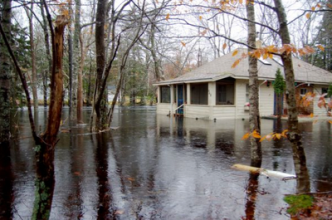 Nova Scotia Premier Darrell Dexter toured flood-ravaged areas of the province by helicopter yesterday after torrential weekend rain swamped several southwestern communities.
Nova Scotia Premier Darrell Dexter toured flood-ravaged areas of the province by helicopter yesterday after torrential weekend rain swamped several southwestern communities.
The helicopter tour included aerial views of the devastation in Barrington, Yarmouth and Argyle, where local states of emergency were declared.
“You can see just, in some cases, the tops of trees. Islands that were there have ceased to be. Buildings are surrounded or engulfed by water,” Dexter said. “It’s a dramatic situation.”
A weekend deluge of 200 millimetres of rain prompted evacuations, forced road closings and took out bridges as swollen rivers broke their banks.
The cost of the widespread damage -while not yet officially tallied -is expected to be in the millions of dollars, Dexter said.
Any forthcoming disaster funding would not flow until the final tally of the damages is completed, but Dexter has already warned Nova Scotia MP and cabinet minister Peter MacKay that the province will take any help the feds can give.
Relief is expected in the form of sunny, dry weather into this weekend, according to Environment Canada meteorologist Bob Robichaud.
Robichaud said rain would stop in the hardest-hit areas in southwestern Nova Scotia by yesterday afternoon. “It’s going to be nice for people there to actually see the sun. All that water should make it through the water system over the next few days and then you will really start to see the water levels go down.”
Most of the swollen rivers already started to recede yesterday, but the province is warning the threat is not over. Dexter said some damage may not be visible, including contaminated wells, compromised building foundations and unsafe roads and bridges.
“We are still not out of the woods,” said Ramona Jennex, Nova Scotia’s minister responsible for emergency preparedness. “There are significant amounts of water and it can still undermine our riverbanks and our infrastructure.”
The flooding is the second severe weather event in Nova Scotia in recent months. In August, flash floods destroyed the only road into Meat Cove, a community in Cape Breton.




